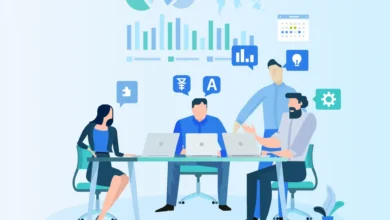Tech Hacks for Your Mental Health
Today’s nonstop pace strains mental health. Stress and loneliness challenge wellbeing. However, technology now expands care options through the screens that surround us. Online connections, counseling, and motivation apps bring help to personal devices.
While still no replacement for in-person interactions, these digital tools widen access to support. As life becomes increasingly fast-paced, technology is carving out new avenues for nurturing wellness amidst modern demands. This article explains cutting-edge ways technology may empower healthier minds.
Embracing Virtual Connections for Mental Health
People need connections to others for good mental health. But busy lives and physical distancing can make people feel lonely and disconnected. Using technology tools for virtual interactions helps provide missing connections. This improves mental well-being, research shows.
According to a study by the National Institutes of Health. during the COVID lockdowns looked at this. People who used phone calls, video chats, social media, and texting more often had better mental health over the isolation period. Interacting virtually more frequently helps people feel less lonely. This is crucial for our mental state, especially when physical distancing is necessary.
Tools like video calls, online support groups, and text messages allow relationships to continue despite separation. We can use technology to talk, relate, and support each other during tough times. All people need a sense of community and belonging. Virtual connections provide this when physical meetings are not possible. They enable us to get social contact, conversation, and care from a distance. Strengthening bonds virtually this way aids mental health.
Online Therapy: Accessible and Effective
Therapy once required scheduled office visits in person. Now, thanks to technology, counseling is more accessible from home. Through secure video sessions, phone calls, text messaging, and custom patient portals, patients can communicate with therapists and engage in treatment confidentially. By eliminating commute barriers, virtual therapy opens doors for those who previously could not access care due to life balance limitations.
Dedicated providers utilize therapy notes to track patient progress. By comparing changes in moods, behaviors, and goals over time, therapists pinpoint the most effective strategies for each individual. These insights inform personalized care plans for long-term wellness.
The pandemic underscored online therapy’s strengths. As isolation increased demand, virtual behavioral health services grew 268% in 2021 alone. Through screens, patients received vital support despite quarantine challenges. Just as effective as in-person counseling, teletherapy offers flexibility and comfort. From our safe spaces, we can prioritize mental health on personal timelines without stigma barriers. Through technology, therapeutic relationships transform to meet modern needs.
Self-Care and Motivational Apps
In our busy day-to-day lives, it’s easy to lose sight of taking care of our mental health. But we have an amazing opportunity to take back some control using self-care apps right on our phones or devices. These clever apps can help us check in with our moods, thoughts, feelings, and habits through journaling, surveys, mood trackers, and more. Look at the data below that shows the mental health app usage data:
| Data Source: National Institutes of Health |
By raising our self-awareness in these areas, we empower ourselves to notice patterns and make improvements or changes for the better. Self-care apps may provide useful tools for goal setting, building healthy routines, meditating, moving our bodies, improving sleep, challenging our brains, and more.
Using these apps keeps us motivated and gives us valuable skills for nurturing better mental wellness through personal growth and development. The widespread use and popularity of self-care apps show that many have found them to be a real and accessible resource in supporting mental health in our hectic modern lives.
Learning from Reputable Digital Resources
As mental health issues rise, many now go online seeking insights on personal struggles. Digital resources like mental health websites, podcasts, online support groups, and social media can provide helpful perspectives we may not get elsewhere. Mental health experts confirm these online tools play an important role in improving knowledge. When searching online, look for sources tied to leading organizations, qualified professionals, or evidence-based research.
Ensure that the people providing information have expertise. Take time to confirm the reliability of sources misinformation spreads easily online. But many trustworthy platforms provide facts on disorders, treatments, coping methods, and more. Those struggling can connect with others going through similar experiences. While in-person support is still crucial, quality online mental health resources empower people through information and connectivity. Using care to identify trusted resources is key. Their wise voices can guide those on the mental health journey.
It is wise to get mental health details only from reputable sites. Ask yourself – does this source state who created it and what expertise they have? Be extra discerning, as anyone can publish anything online without oversight. However, there are excellent online resources available for gaining knowledge about conditions, symptoms, therapies, skills, and healthy coping strategies. With care in determining which are reliable, we can all expand our mental health literacy.
Organizational Tools for Stress Reduction
Feeling disorganized can harm mental health by increasing stress. Luckily, technology gives us many tools to take control of busy schedules, paperwork, and clutter that overwhelms us.
Calendar and scheduling apps help us plan out days and meet deadlines that might otherwise pile up. Cloud storage services neatly sort computer documents, so they don’t get lost. Home organization websites provide useful tips for systematically decluttering physical spaces. By tackling disorder with these tech tools, we free up mental energy previously wasted feeling anxious and scattered.
This technology-enabled organization creates much-needed peace of mind and calm for better mental wellness. With apps that simplify scheduling and paper clutter management, we can transform chaos into order. Reducing stress from disorganization is a key benefit of using organizational technology for self-care.
Entertainment for Emotional Health
Technology provides many entertaining forms of media that can boost our moods and support emotional health. Research confirms that watching shows and movies, listening to music, reading books, and other entertainment activities have wellness benefits. They can relieve stress, spark laughter, motivate us, and trigger other helpful emotional responses.
For example, funny comedies induce laughter, which relieves tension. Moving stories in films, songs or books builds empathy for others facing challenges. Uplifting songs can comfort and inspire us. Choosing entertainment media well-matched to fulfill our emotional needs in the moment nourishes mental well-being. With podcasts, video, and audio streaming platforms offering more options than ever, we have countless ways technology enables entertainment to lower anxiety, elevate spirits, and improve emotional health.
Creative Outlets Online
The internet provides new ways to tap into creativity for better mental health. Online creative communities allow people to share and get feedback on art, writing, music, and other projects. Live-streamed painting lessons or virtual cooking classes teach new skills.
DIY videos inspire home projects that provide a sense of accomplishment. Mindfulness apps lead to short meditations and exercises. Even online games and puzzles give an outlet for creative thinking.
Having these digital creative spaces and activities at our fingertips can boost motivation and self-esteem. The options for creative expression online are endless for those seeking an emotional lift or distraction.
Planning Getaways and Nature Escapes
Getting out into nature provides proven mental health benefits. With many feelings increased stress and isolation lately, planning getaways and escapes outdoors can be revitalizing. Online tools make it easy to research locations and trip details.
Websites showcase beautiful parks, trails, springs, beaches, and forests to explore. Travel blogs and vlogs give firsthand tips for camping, hiking, and sightseeing. Interactive maps provide information on area attractions and amenities.
Nature camera live streams offer virtual walks alongside babbling brooks or ocean waves. Online planning of an outdoor adventure can spark optimism and excitement. A change of scenery and immersion in nature can be just what our minds need.
Conclusion
Our mental health depends not just on self-care but also on bonds, knowledge, creativity, and leisure. With awareness, we can use technology to enable these pillars of wellness despite disruptions and stress. Virtual connections maintain community, online therapy enables counseling access, apps build healthy routines, digital resources provide information, organization tools reduce chaos, entertainment uplifts moods, creative outlets nourish self-worth and nature getaways offer renewal.
As tech progresses, our ability to nurture mental health regardless of circumstances also expands. Try incorporating a few tips from this article into your self-care. It can greatly boost mental wellness.





Thanks for sharing. I read many of your blog posts, cool, your blog is very good.